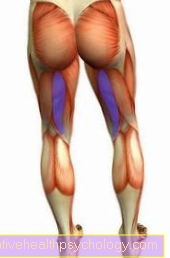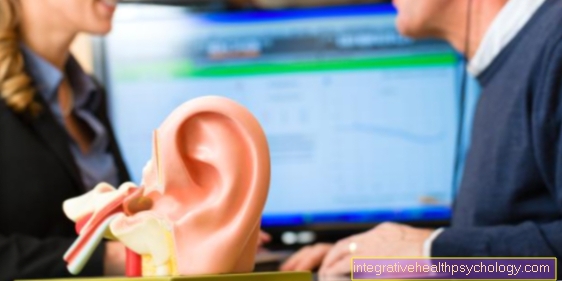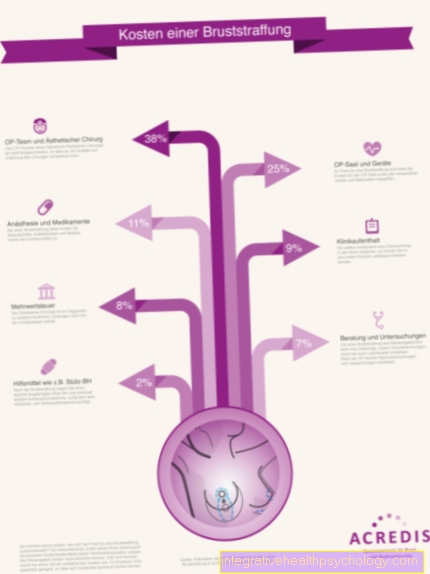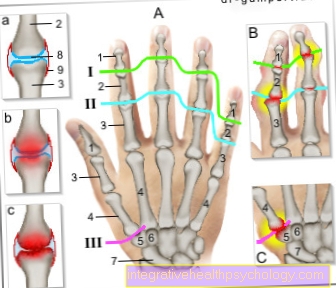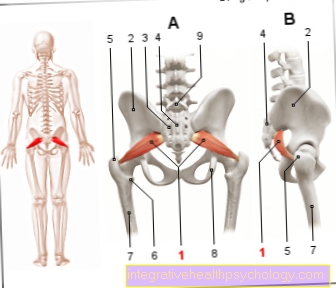Transient global amnesia
definition
As the name suggests, it is the transient global amnesia (TGA) to a temporary disturbance of the memory function. Global amnesia is when all memory functions are extinguished. No more information can be saved; Even memories that were stored in the memory years or decades ago can no longer be called up in the case of global amnesia. This disturbance lasts between 1 and 24 hours.

causes
Ultimately, the cause of transient global amnesia has not been finally clarified. Numerous causes are discussed. First and foremost, it is thought that short-term circulatory disorders in the brain stem can trigger the temporary memory impairment. In MRI images of affected patients, you can see corresponding abnormalities in these areas. However, it has not been shown that transient global amnesia is a risk factor for stroke. This speaks rather against the hypothesis of a temporary circulatory disorder. It therefore remains to be seen what further results the research will achieve in this regard.
Which drugs cause TGA?
The term transient global amnesia (TGA) stands for a temporary memory disorder that occurs suddenly and disappears again without external influences. Of course, certain medications can also cause short-term memory loss. However, one would then not speak of a TGA in medical terminology. Benzodiazepines are a classic example of drugs that cause short-term amnesia. These also have an anti-anxiety effect. Because of these two effects, they are the ideal medication to prepare for anesthesia.
Transient global amnesia from alcohol
After excessive alcohol consumption sometimes comes to a so-called blackout. This memory gap can last for several hours. This is also a form of transient amnesiai.e. the memory recovers over time. It is very different from what amount of alcohol there is amnesia. With chronic alcohol consumption, vitamin B1 deficiency can cause a so-called Korsakov syndrome (A form of memory disorder) arise. The main symptom of this disease is amnesia. This sometimes consists of one global shapei.e. Both experienced events and new content can no longer be accessed. Often, however, old memory contents are easy to remember. However, the patients cannot remember what they have experienced. Those affected unconsciously fill these gaps in their memories with fantasy.
The following article deals with this topic in detail: Korsakoff syndrome
Transient global amnesia due to fatigue
Fatigue alone does not usually lead to a complete (= global) Amnesia. There is no connection between classic transient global amnesia and fatigue. When tired, however, there are often disorders of the ability to concentrate and a reduced perception. Memory can also be limited. New content can no longer be stored so well in the memory. Old memories, such as biographical information, can usually be accessed for a long time without any problems, even if you are tired.
Transient global amnesia due to migraines
A relationship between transient global amnesia (TGA) and the clinical picture of migraines is suspected again and again. Studies have found that up to 30% of patients affected by TGA have had a migraine attack in their lifetime. Often times, patients with TGA also report headaches. that a classic migraine attack leads to TGA has not yet been observed. It should be known that migraines in general are a widespread disease and that more than 20% of the general population have suffered from migraines at least once in their life.
Diagnosis
Any diagnosis is based on medical history and physical examination. A thorough neurological examination must be carried out in the event of a memory disorder; this is necessary in the case of transient global amnesia (TGA) mostly inconspicuous. In the second step, further diagnostics should always be carried out. Computed tomography is the method of choice. Although there are no specific abnormalities in the CT image of TGA, the examination is important to rule out a stroke or cerebral hemorrhage. The diagnosis of a TGA can often only be made with certainty afterwards. If the memory returns after 24 hours at the latest, one goes from one TGA out.
Symptoms of transient global amnesia
The main symptom of transient global amnesia (TGA) is memory impairment. The patient's memory is reduced. This leads to a disruption of the orientation. The patient cannot give precise details about the time, place and situation. There are also gaps in memory regarding the more recent and to some extent also the older past. This makes many patients insecure and restless. Often they ask the same questions over and over again, even though they have already been answered several times. It is also typical that motor Processes can often still be accessed very easily. Driving a car or bicycle is usually no problem for the patient. Headache is also given as an accompanying symptom. Further neurological Symptoms such as sensory disturbances or paralysis do not occur with TGA. If other accompanying symptoms occur, the diagnosis of a TGA must be critically questioned. Strokes, cerebral hemorrhage, traumatic brain injury or epilepsy are always possible differential diagnoses for memory disorders. Therefore, one should look very carefully for corresponding accompanying symptoms that are not typical for a TGA.
Transient global amnesia postcoital
The term postcoital means “after intercourse”, so it refers to events that take place immediately after intercourse. There are individual cases of post-coital amnesia known. The high level of excitement during an orgasm can cause short-term memory to stop temporarily. These patients usually do not show any abnormalities in the anamnesis or physical examination. Cross-sectional imaging of the brain (usually computed tomography) should be performed to rule out stroke and cerebral hemorrhage. The condition improves spontaneously after up to 24 hours.
therapy
For transient global amnesia (TGA) is a sudden onset of memory disorder that lasts for a maximum of 24 hours. There is no specific treatment or therapy. You have to wait until the memory disturbance goes away. One cannot accelerate this process with medication. Computed tomography of the skull must be performed to rule out a serious cause for the memory impairment. Since it is a stroke or one Cerebral hemorrhage If there is a medical emergency, a hospital admission usually takes place.
There, these causes of memory impairment can be quickly ruled out. Until the memory returns, the patient is often monitored in the hospital. Medication can be administered symptomatically. If the patient complains of headaches, for example, these can be relieved with painkillers. In principle, a patient can use TGA can of course also be treated on an outpatient basis. However, it is important that the patient is not alone but is well looked after by a trusted caregiver.
Duration of transient global amnesia
In transient global amnesia (TGA) is a temporary memory disorder that starts suddenly and ends spontaneously. By definition, it takes between 1 and 24 hours. On average, the disruption lasts between 6 and 8 hours. Then the memory returns. The patient has a memory gap during the TGA. Older memory contents can be accessed again without any problems after the TGA, and the ability to remember new events is not restricted. The patient has no memory of the time of the TGA.
forecast
A transient global amnesia (TGA) is a temporary memory disorder that disappears by itself after a maximum of 24 hours. In contrast to a memory disorder that is triggered by a stroke or cerebral hemorrhage, the prognosis for a TGA is good. No consequential damage remains. The memory is not damaged by a TGA. However, up to 20% of patients can have a new TGA episode in the course of the disease.
Consequences of transient global amnesia
A transient global amnesia (TGA) is usually experienced as very stressful for the patient and his relatives. On the one hand, there is considerable uncertainty on the part of the patient due to the disorientation. The same questions are asked over and over again. In addition to worrying about the patient, relatives experience this as extremely stressful. The TGA ends after 24 hours at the latest. The patient cannot remember this time. New content can then be saved again without any problems. The patient now also has unrestricted access to old memories - before the TGA. A long-term impairment of memory could not be shown in any study. There is also no increased risk of stroke. Serious consequences are not to be expected for patients after TGA.





